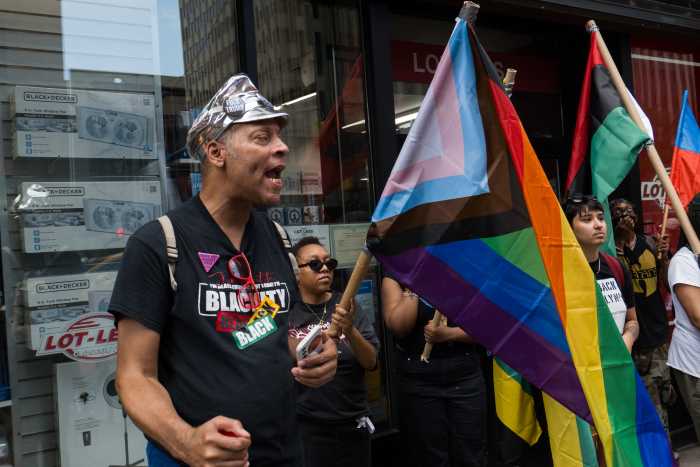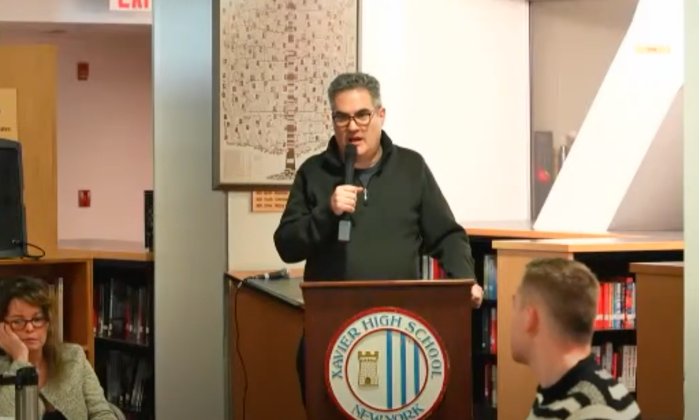On Super Tuesday, as voters in Deborah Glick's 66th district made their way to the polling place on Bank Street where the out lesbian Democratic assemblywoman casts her ballot, gender rights activists were on hand outside, clipboards at the ready, asking them to sign letters to the four-member LGB caucus in the State Assembly. The letters request their “active support” in bringing the Gender Expression Non-Discrimination Act (GENDA) to a vote this year.
Tuesday's call to solidarity exemplifies the soldier-on attitude of the New York gender rights activist community, who remain stalwart in the face of five years of inaction in Albany on their bill, as well as a revised, trans-exclusive version of the federal Employment Non-Discrimination Act passed by the House and under consideration by the Senate in Washington, and perhaps most alarmingly, the seeming indifference of the larger gay and lesbian community.
Election day action targets Glick, O'Donnell, urging them to push bias bill.
Gender equality leaders say their fight has consistently been put on the back burner of LGBT causes.
While gay men and lesbians receive state protection under the 2002 Sexual Orientation Non Discrimination Act (SONDA), transgender activists, more than five years later, are still waiting for the Assembly, controlled overwhelmingly by the Democrats, to take up GENDA. The New York City Council added a gender identity and expression clause to the Human Rights Law in 2002, but such a provision is absent from state law.
Last June, as the Assembly passed a marriage equality law less than three months after it was introduced by Democratic Governor Eliot Spitzer, trans leaders expressed frustration that the issue had leapfrogged over GENDA. The marriage bill passed with 85 votes, but GENDA had the support of 95 members of the Assembly, according to a tally on the website of the Empire State Pride Agenda (ESPA), the state's LGBT lobby group.
In June interviews with Gay City News, Melissa Sklarz and Donna Cartwright, two longtime transgender rights advocates, charged that some of the fault lay with the Pride Agenda and its priorities. In three volleys of letters to the editor of Gay City News, Cartwright and Alan Van Capelle, ESPA's executive director, debated the group's commitment to the issue of gender equality.
Cartwright wrote that “ESPA just seems to be going through the motions.” In response, Van Capelle voiced the Pride Agenda's dissatisfaction with “the pace of progress being made in getting the GENDA enacted into law in New York,” suggesting that the problem was primarily the fault of the Assembly, its leadership, and members who should be advocating more strongly for the community. Van Capelle argued as well that protections for gender identity and expression require “a separate conversation with straight New Yorkers.”
Now, ESPA and leading gender rights advocates seem squarely on the same page. In a press release issued on primary day, the group noted that nearly two-dozen organizations and activists had come together on February 1 to sign on to a letter saying that GENDA's passage “is an essential element to putting transgender people on the pathway [to gain control of their lives] in New York.” In addition to ESPA and trans rights groups and activists, the letter was signed by Gay Men's Health Crisis, New York City's LGBT Community Center and similar venues elsewhere in the state, several chapters of Services and Advocacy for GLBT Elders (SAGE), the New York Civil Liberties Union, and Congregation Beth Simchat Torah, the city's LGBT synagogue.
Sklarz, on hand Tuesday at Glick's polling place, said, “I'm thrilled to be working with the Pride Agenda.”
Desma Holcomb, an ESPA staff member on the scene, said voters were responding knowledgeably and supportively when asked to sign the letters. The activists had roughly 150 letters in hand after three hours' work, beginning at 6 a.m., at the Bank Street location.
Another team of activists was on the Upper West Side at the polling site used by Daniel O'Donnell, the gay Democrat who steered the Spitzer marriage bill through the Assembly. One advocate proudly boasted of having secured a signature from John Banta, O'Donnell's partner of more than two decades.
In addition to Glick and O'Donnell, the LGB caucus includes East Side Democrat Micah Kellner and Staten Island Democrat Matt Titone. GENDA is sponsored by Chelsea Democrat Dick Gottfried, who is not a member of the caucus, but is a longtime LGBT advocate.
As with the marriage bill, even if the Assembly moves on GENDA, the Republican-controlled Senate is unlikely to follow suit.
Sklarz acknowledged the effort that remains before the activists.
“The GENDA bill is always going to be work and we have to create a grassroots movement,” she said, adding however that she was “pleased” to find so many voters aware of the issue.
Beth Bogart, a straight woman who lives in the West Village, turned out to help Sklarz and Holcomb Tuesday morning.
“I was shocked to discover that this bill still hasn't moved anywhere,” she said.


































